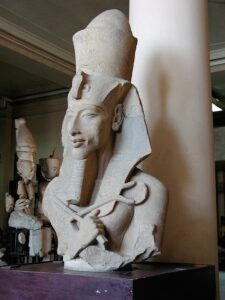The Monotheism of the Heretic Pharaoh, Donald B. Redford, Biblical Archaeology Review (13:03), May/Jun 1987.
Akhenaten, pharaoh of Egypt for 17 years between 1375 and 1358 B.C., has often been identified as the first monotheist. Beginning with Sigmund Freud, some have suggested that Akhenaten’s monotheism exercised a direct, or possibly indirect, influence on Mosaic monotheism, although Moses probably lived a hundred years or more after Akhenaten.
Others have even gone so far as to find in Akhenaten a harbinger of Jesus. After all, Akhenaten did call himself the son of the sole god, “thine only son that came forth from thy body.”
Whether for these or other reasons, Akhenaten remains one of the most intriguing and absorbing Pharaohs who ever lived, vying in popularity with such pharaonic giants as Thutmose III and Ramesses II and even with that relatively minor Pharaoh Tutankhamen, who, as King Tut, is known to all because of the treasures found in his tomb. The great Egyptologist Henry Breasted called Akhenaten “the first individual in History.”
Read the rest of The Monotheism of the Heretic Pharaoh in the online Biblical Archaeology Society Library.




